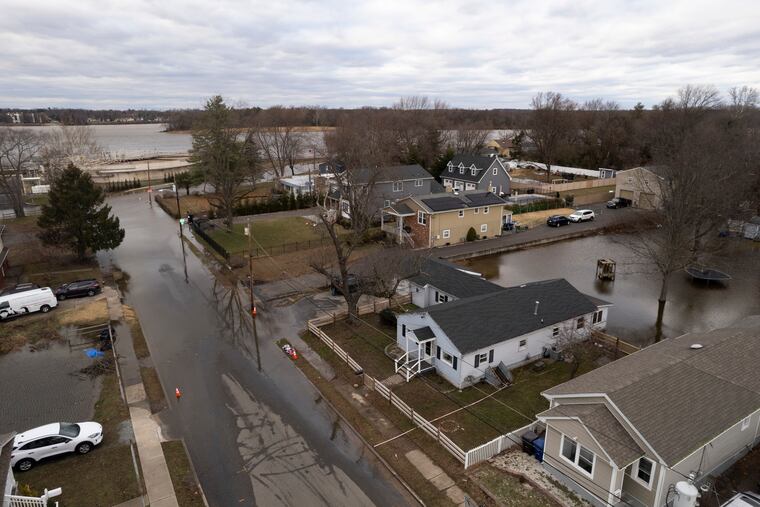Flooding in Burlington County damages homes and leaves riverside residents wading in the mud
The Delaware River crested at nearly 12 feet on Tuesday near Delran and Riverside Townships, topping the previous record set three years ago during Ida.

Swaths of flood-prone areas in the Philadelphia region were spared serious damage after Tuesday’s storm, but Burlington County was not among the lucky.
Delran saw the county’s most severe flooding from the Delaware River and the Rancocas Creek that merge nearby — the bodies of water after which the New Jersey township is named. County officials said the storm resulted in three water rescues and damage to more than 50 homes. Residents said at least one home was condemned due to water damage, while others chose to voluntarily evacuate as they contended with extensive damage.
On the hardest-hit streets, residents waded through mud on Wednesday to assess the destruction. Drainage hoses snaked out from dozens of homes, pumping out flooded basements and shin-high pools of water in backyards. Lawns remained soggy more than 1,500 feet inland from the Rancocas — evidence of how far the river swelled the night before.
“Water was just coming in from all sides,” said Debbie Roe, 70, who has lived on Stewart Avenue with her husband for five decades. “We never had a flood for the first 30-some years. But then, right around [Hurricane] Sandy, we got it. And then after that, we’ve been getting it.”
Two doors down, a distraught family loaded a moving truck in front of their home that had been condemned. Around the corner, a resident got in a heated shouting match with another man who drove a raised pickup truck through the still-flooded street, sending a wave of water rushing back onto his lawn.
The Delaware River in Burlington County crested at nearly 12 feet on Tuesday, topping the previous record set during Ida in 2021. On Wednesday,some residents were still waiting for township officials to respond to their calls for assistance pumping water. Emergency workers were seen throughout the neighborhood tending to damaged properties Wednesday. But some residents alleged that while the township had promised more flood barriers along the river, nothing had materialized.
“They talk, but they don’t do anything,” said Darlene Parker, a 30-year resident whose lawn and basement were flooded.
Most of the homes in Delran and neighboring Riverside Township were built in the 1950s, said Parker. And while some, like hers, are elevated several feet above ground, an increasing volume of storms have battered their properties over the last decade. She now has a crack in her basement wall that leaks during heavy rains.
For some, the storm raised questions about an uncertain future. Roe said she and her husband, both in their 70s, did not know how they could handle worsening storms: “We’re getting too old. We can’t handle this kind of stuff. [My husband] had a stroke in 2009. It’s hard.”
Carol Grockenberger, 79, whose home sits adjacent to the Rancocas, said the water rose to her front door on Tuesday night. “Ten more years from now, it might be underwater,” she said. “I don’t think it’s getting any better.”
Others looked for optimism in the puddles. EMT and volunteer firefighter James Otis worked a hectic shift Tuesday night, responding to downed power lines and trees, only to come home to “a new swimming pool” in his backyard at 6 a.m.
Three feet of water filled the crawlspace and six inches seeped into Otis’ one-story home on Alden Avenue, where he has lived for 15 years. “Who do you get upset at?” he asked himself, standing in rubber boots in water up to his ankles behind the house. “It does no good to get upset at any one person, because it’s not any one person’s fault.”
“It’s Mother Nature’s fault,” his nearby granddaughter countered. Otis chuckled.
“You get upset with her, she’s just going to deal you another hand,” he said.
The most important thing for Otis was that nobody in the neighborhood was hurt; the rest can be remedied by flood insurance and a little time for things to air out.
“That’s what we have industrial-strength dryers for,” he said.